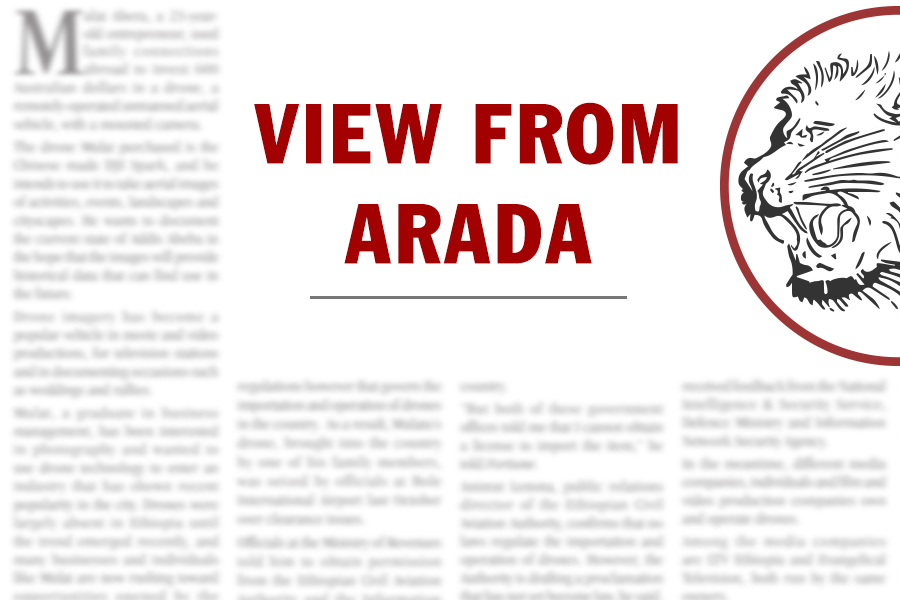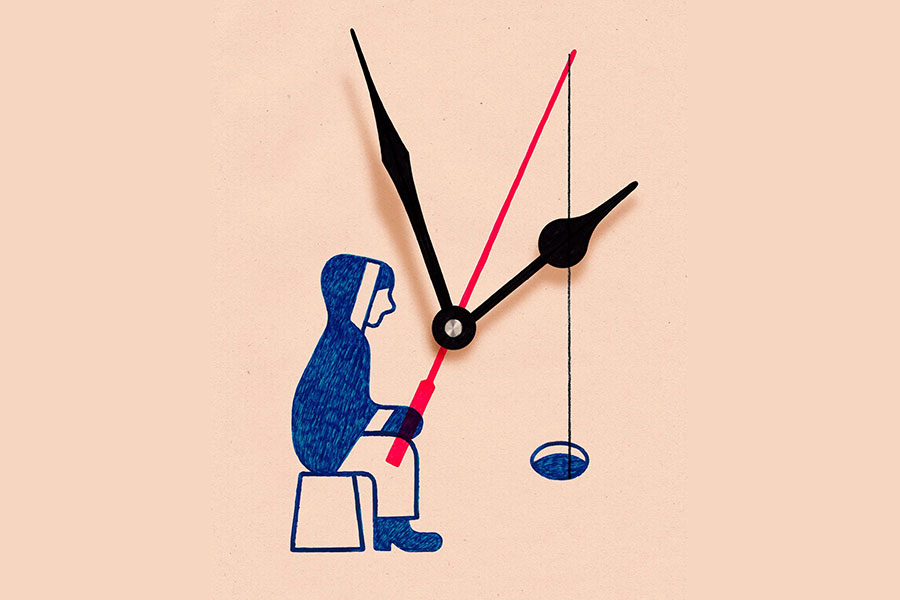
Sunday with Eden | Jun 15,2019
Feb 9 , 2019
By Habtamu Girma
Shortly after being elected Prime Minister of Ethiopia, Abiy Ahmed (PhD), stated that lack of integrity would be one of the challenges his leadership would face. Just this month, in his speech to parliament on the half-year performance of his government, the premier reiterated the challenge as a core hindrance.
But this time, Abiy was cautious but explicit about the problem when he referred to it, by my estimations, in softer wording. As he reckoned, "it is unfortunate that Ethiopians are people with a short-term memory.”
Such a reporting of the problem implies two crucial factors. The first is that the problem is beyond the capacity of the government but in the hands of every Ethiopian. Secondly, the way to confront the problem requires each one of us to develop a character that can be generalised as the will and determination to arrest individual ego and firm obedience by moral laws.
The importance of identifying “short-term memory” also has to do with M’edemer, a concept that Abiy has introduced. As one may learn from the contextual background of the Prime Minister's speech, short memory mindset breeds counterproductive traits such as immorality, disloyalty and mistrust, all of which are antithetical to the behavioral foundation of M’edmer’s love, reconciliation and unity.
But it is crucial to conceptualise what lack of integrity is, a popular problem in the social and moral characteristics of the nation, especially in its contributions to the recent political crisis in Ethiopia. It is manifested by two interrelated factors, leadership crisis and institutional, both formal and informal, dysfunctionality.
A genuine diagnosis on the ailments and prescriptions to lack of integrity then should base itself on methodological individualism, an analytical tool that explains social phenomena from the individual unit of analysis.
The term integrity is found more in theological teachings but there are academic references to it as well.
The lexical definition of integrity bases itself from the combination of the Latin words “integritas” and “integra” meaning whole, undivided, unbroken, or complete. It is doing the right thing, staying true to oneself and one’s word, even when we are faced with serious consequences for the choices that we are making for the Random House Dictionary. In layman’s terms, it means to be good.
The broader definition on the conduct of integrity includes three interrelated virtues it embraces: adherence to moral and ethical principles, which is soundness of moral character and honesty; a state of being whole; and being sound, unimpaired.
The three virtues of integrity combine to form the three aspects of integrity: ego, rationality and morals. From the perspective of the first element, integrity means one's ability to rise above egos. For the rationality angle, integrity involves traits of showing thoughtfulness and consistency in making decisions or taking actions.
From a moralistic point of view, integrity implies loyalty to acceptable moral standards by virtue of being a human - the roles and expectations in age, profession, family or societal status. It is the moralistic aspect of integrity that justifies one's legitimacy for a leadership role.
Under such definitions, does a lack of integrity characterise the social character of Ethiopians?
We recognise integrity as an important asset. With scanty historical accounts on the fabric of Ethiopian society, existing documents depict Ethiopians as being well-acclaimed for their values of integrity in the past, a portrayal that is often taken for granted.
Moreover, it was customary that Ethiopian rulers justified their regimes on the cause of defending the values of integrity. Imperial regimes even pursued closed door policies on the grounds of defending Ethiopian values from those that are imported. As time went by, there was the belief that the advent of globalisation threatened to contaminate the integrity of Ethiopians. Indeed, there is an argument to be made that crucial elements have since been eroded.
The integrity since received a great deal of attention ever since the Second World War. Those years were when Ethiopian artists and writers in their novels, stories, poems, plays and songs raised the idea that integrity was threatened and struggled in their works to defend the cause. One can look at Ethiopian literary giants such as Kebede Michael, Mekonnen Endalkachew, Roman Work Kassahu, Senidu Gebru, Hadis Alemayehu, Abe Gubegna, Assefa Gebre Mariam and Yilma Deressa.
The popular factors depicted to corrupt integrity have been capitalism and globalisation, the two absolutes that have defined the 20th and 21st century. Though most Ethiopians have not fully embraced them, the spirit of capitalism and effects of globalisation are fast prospering.
Nonetheless, what both require to function properly is integrity of agents in transactions. In the age of capitalism, where much of everything can be bought and sold, integrity is a necessity.
In a time when globalisation is at its zenith, our world has become a village. As a result of that, every knock in one corner of the world is heard in another corner. The cost of breaching integrity is thus so dear that every one of us is subject to the cost.
Ethiopians need to note these factors and evaluate intrapersonal, interpersonal and societal interactions as they are impacted by factors that touch upon everyday life. The dwindling characters of integrity need to be upgraded, as the reality is that it is disintegrating.
We are unable to be good to ourselves let alone to others. In a contorted manner, and in a detachment from the past as well as global understandings of it, we have come to perceive integrity as old fashioned. It is ironic but not unsurprising that we blame each other or point fingers at others for our woes, pretending to be free of culpability.
But how can all of us be clean while all of us have a “they” to point a finger at? Who is to blame if everyone perceives themselves to be innocent?
PUBLISHED ON
Feb 09,2019 [ VOL
19 , NO
980]


Sunday with Eden | Jun 15,2019

View From Arada | Feb 01,2019

Sunday with Eden | Jul 22,2023

Radar | Dec 05,2020

View From Arada | Mar 11,2023

Viewpoints | Oct 24,2020

Viewpoints | Jun 14,2025


Featured | Oct 06,2024

View From Arada | Oct 10,2020

My Opinion | 131548 Views | Aug 14,2021

My Opinion | 127903 Views | Aug 21,2021

My Opinion | 125879 Views | Sep 10,2021

My Opinion | 123509 Views | Aug 07,2021

Dec 22 , 2024 . By TIZITA SHEWAFERAW
Charged with transforming colossal state-owned enterprises into modern and competitiv...

Aug 18 , 2024 . By AKSAH ITALO
Although predictable Yonas Zerihun's job in the ride-hailing service is not immune to...

Jul 28 , 2024 . By TIZITA SHEWAFERAW
Unhabitual, perhaps too many, Samuel Gebreyohannes, 38, used to occasionally enjoy a couple of beers at breakfast. However, he recently swit...

Jul 13 , 2024 . By AKSAH ITALO
Investors who rely on tractors, trucks, and field vehicles for commuting, transporting commodities, and f...

Jun 28 , 2025
Meseret Damtie, the assertive auditor general, has never been shy about naming names...

Jun 21 , 2025
A well-worn adage says, “Budget is not destiny, but it is direction.” Examining t...

Jun 14 , 2025
Yet again, the Horn of Africa is bracing for trouble. A region already frayed by wars...

Jun 7 , 2025
Few promises shine brighter in Addis Abeba than the pledge of a roof for every family...

Jun 29 , 2025
Addis Abeba's first rains have coincided with a sweeping rise in private school tuition, prompting the city's education...

Jun 29 , 2025 . By BEZAWIT HULUAGER
Central Bank Governor Mamo Mihretu claimed a bold reconfiguration of monetary policy...

Jun 29 , 2025 . By BEZAWIT HULUAGER
The federal government is betting on a sweeping overhaul of the driver licensing regi...

Jun 29 , 2025 . By NAHOM AYELE
Gadaa Bank has listed 1.2 million shares on the Ethiopian Securities Exchange (ESX),...